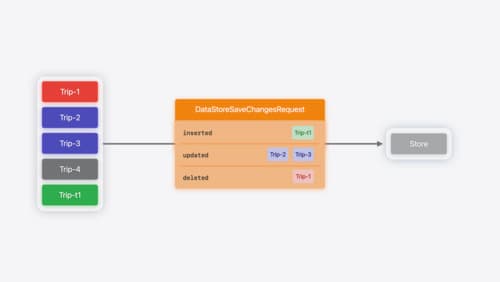diffable data sources and core data
Asked on 2024-07-31
1 search
To understand how diffable data sources and Core Data are integrated with Swift Data, you can refer to the following sessions from WWDC 2024:
-
- This session discusses how Swift Data integrates with Core Data, making it easier to work with queries while iterating on views. It also covers the expanded capabilities of Swift Data, including custom data stores and tracking changes in a datastore.
-
Create a custom data store with SwiftData:
- This session provides a detailed example of creating a custom data store using Swift Data. It explains how to adopt a custom store in Swift Data and how it can read and write data to any storage format or persistence backend.
-
- This session highlights the new features in Swift Data, including custom data stores, indexing, and unique constraints. It also shows how to use Swift Data APIs with different data formats and how to create custom containers for use with Xcode previews.
Relevant Chapters:
-
Create a custom data store with SwiftData:
- 0 = Introduction
- 81 = Overview
- 290 = Meet DataStore
- 462 = Example store
-
What’s new in SwiftData:
- 0 = Introduction
- 57 = Adopt SwiftData
- 131 = Customize the schema
- 163 = Unique macro
- 217 = History API
- 269 = Tailor a model container
- 339 = Custom data stores
- 401 = Xcode previews
- 560 = Customize queries
- 618 = Expression macro
- 716 = Index macro
These sessions and chapters will provide you with a comprehensive understanding of how diffable data sources and Core Data are utilized within the Swift Data framework.

Create a custom data store with SwiftData
Combine the power of SwiftData’s expressive, declarative modeling API with your own persistence backend. Learn how to build a custom data store and explore how to progressively add persistence features in your app. To get the most out of this session, watch “Meet SwiftData” and “Model your schema with SwiftData” from WWDC23.

What’s new in SwiftData
SwiftData makes it easy to add persistence to your app with its expressive, declarative API. Learn about refinements to SwiftData, including compound uniqueness constraints, faster queries with #Index, queries in Xcode previews, and rich predicate expressions. Join us to explore how you can use all of these features to express richer models and improve performance in your app. To discover how to build a custom data store or use the history API in SwiftData, watch “Create a custom data store with SwiftData” and “Track model changes with SwiftData history”.

Platforms State of the Union
Discover the newest advancements on Apple platforms.
